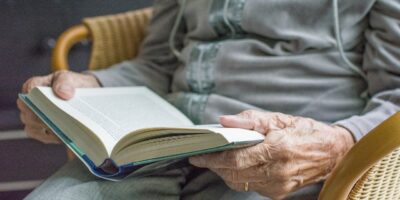Your Questions Answered: “How do I support people who stay in their rooms all day and when I’m busy with other residents?”
Helen Johns, the lead trainer on our Activity Coordinator Training Course, writes …
Some people will, either by choice or through necessity, spend most of their time in their bedroom. This can be incredibly isolating and make the time alone very boring. It is important that we spend time with all residents, so you must allocate time for those in their own rooms. However, we also need to consider how we ensure that they are supported whilst we arent with them.
My answer builds on the blog from earlier in the year – Clean & Tidy – which explored the merits of having lounges and other communal spaces that stimulate residents. The key themes in this were around creating a homely, comfortable, stimulating environment, and I’d like to consider this when thinking about personal spaces, such as bedrooms.
The questions we asked about communal spaces still apply: How are people supported to access things that might stimulate them? If we take things away, what is there to look at?What is there to do? What is there to explore? What can people hear? What is there to touch, smell or taste?

When someone is alone in their room, it is even more important that we support them to be stimulated by their environment. Of course this will be different for every person, as it needs to be tailored to their interests, preferences and current abilities. However, the following prompts may help:
- Is there something within reach for the person to look at, to read, to admire?
- Is there something to listen to? If it is radio is it tuned to a station the person likes? If a CD, is it the type of music they will enjoy? Are we changing the CDs regularly? (Who wants to listen to the same songs on a loop for six hours?)
- Is there something nearby to touch or to rummage through? If the person likes to have a bag (handbag/shopping bag) does it contain a selection of their personal items? What about small rummage boxes? Is there a collection of personalised materials that will stimulate positive memories and evoke feelings of wellbeing?
- Are there some other well-chosen items left out, that may stimulate the persons curiosity (sparkly cushions, textured fabrics etc)?
- Is there something that may encourage an element of daily living activity? A duster or cloth left out on a chest of drawers may be picked up and used to do some light dusting.

As with the communal areas, people need to be supported to engage and explore their surroundings at their own pace and in their own way, and having everything hidden away in cupboards and storage areas doesn’t help. As cognition declines, people will need easy access to things. For some residents you will need to stage the room so that things are left within easy reach.
You will need to take care that you don’t leave too many items about at the same time which may end up confusing people. Conversely, some people like to be able to see ‘all their stuff’ and that will make them feel comfortable.
Also think about access to snacks and drinks. Is there water/juice available in the room without people having to ask for it? What about the about finger food, snacks, treats? This is especially important for those who may not easily recognise, or be able to communicate, their thirst or hunger.
You could get other staff involved too. Asking carers and other staff to do the following thing routinely could make a huge difference to a person’s wellbeing. When leaving a person in their room, before you walk away, look back at the picture of the person in the room. Ask yourself “what is there available for this person to do, see, and hear while they are on their own?” Make sure there are at least one or two things available to stimulate them before you walk away.
We want to hear from you! To ask your own questions please contact .
Helen Johns is the lead trainer for The Daily Sparkle Activity Coordinator Training and has been developing and delivering our courses since April 2017. As well as working for The Daily Sparkle, Helen runs an activity coordinator forum in her local area, provides training and consultancy for care homes in relation to activity and wellbeing and works as an ‘Expert by Experience’ for CQC inspections.




